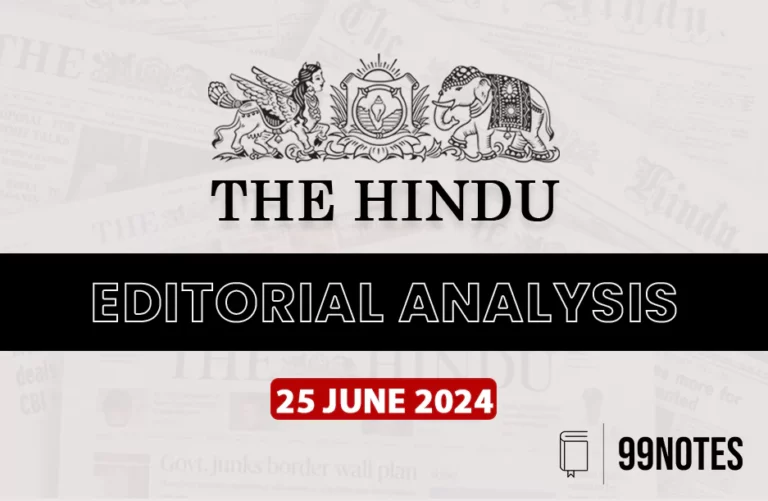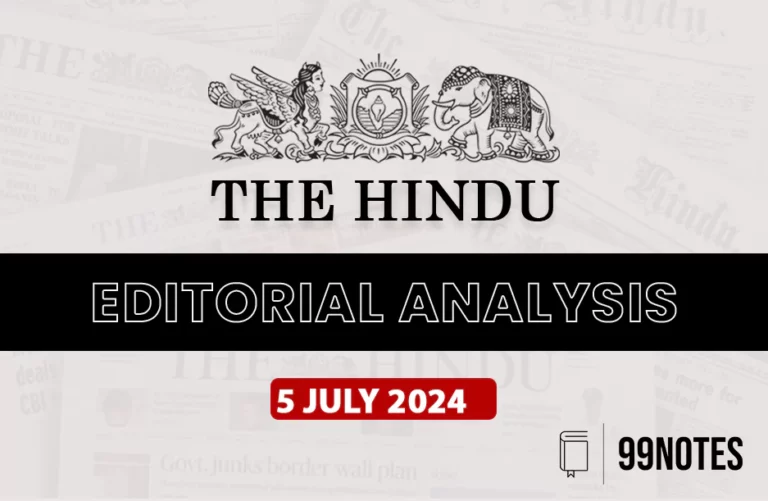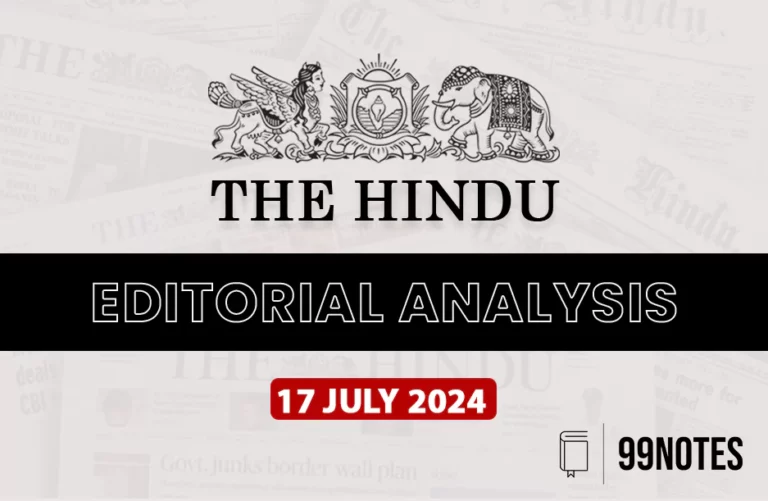27 February 2024 : The Hindu Editorial Notes PDF
The Hindu Editorial
27-February-2024
1. Drop the ‘garland model’ to let science in India blossom
| Topic: GS2 – Governance – Government policies This article highlights issues in Indian scientific conferences, crucial for UPSC due to its connection to S&T development, a key national focus area. |
| Context |
|
Reimagining Scientific Meetings in India
The Role of Scientific Meetings:
- Scientific meetings or conferences are crucial for researchers to share and discuss their findings.
- These meetings often include presentations, talks, and expert interactions on various scientific topics.
The Standard Academic Meeting Model:
- Traditionally, a core group of organizers, often a scientific society, takes responsibility for planning, inviting experts, disseminating information, and managing finances.
- Invited speakers, typically leading researchers, and other researchers paying a fee participate in these meetings.
Modern Trends in Scientific Conferences:
- Contemporary conferences emphasize non-hierarchical interactions, career-stage equity, diversity, and sustainability, in addition to scientific discourse.
- India hosts numerous scientific conferences across various fields, organized by scientific communities and societies.
Challenges with Scientific Conferences in India:
- Outdated Bureaucratic Frameworks:
- Conferences often involve institute administrators and hierarchical organization of organizers.
- Proceedings feature lengthy talks by administrators, late starts, and segregated seating.
- Gift-giving rituals and religious ceremonies are prevalent.
- Lack of Inclusivity and Diversity:
- Scientific programs may lack gender and diversity representation, featuring all-male panels and focusing solely on “women in science” without addressing broader issues.
Examples of Reimagined Conferences:
- No Garland Neuroscience (NGN): This prioritises scientific content and discussions while maintaining a simple, cost-effective approach.
- Young Investigators’ Meeting (YIM): This series focuses on scientific networking and mentorship among life scientists, promoting features like alphabetical speaker lists, round-table seating, gender equality, and open interactions.
The Need for Revamp:
- The persistence of outdated practices hinders scientific progress and fosters inequities.
- Reimagining conferences could promote inclusivity, accessibility, and sustainability.
- This revamp would signal India’s commitment to contemporary scientific practices and global collaboration.
Conclusion:
- Revamping scientific conferences in India is necessary to foster a more inclusive, equitable, and progressive scientific culture.
- This change would not only benefit the Indian scientific community but also project India as a leading player in the international scientific landscape.
| Practice Question: Critically evaluate the current state of scientific conferences in India, and suggest reforms to enhance their effectiveness and global competitiveness (150 words/10 m) |
2. An expansive land management policy is overdue
| Topic: GS2 – Governance – Government policies This topic is crucial for UPSC as it addresses land degradation, a critical environmental issue linked to agriculture, climate change, and sustainable development – key UPSC areas. |
| Context |
|
The Importance of Sustainable Land Management Practices in India
Land: A Multifaceted Resource:
- Land is crucial for human activities, providing ecological, economic, social, and cultural services.
- However, overlooking its multi-dimensionality leads to land degradation and environmental issues.
Global Context:
- Land degradation costs the world an estimated $6 trillion annually.
- The UN Convention to Combat Desertification (COP14) and the IPCC highlight the need for land management solutions.
- The FAO report, “State of the World’s Land and Water Resources for Food and Agriculture,” urges immediate action for sustainable land management.
Challenges in India:
- India faces land management challenges due to its large population and limited land resources.
- Arable land and forest cover are limited, while 30% of the land is already degraded.
- Development needs, population growth, and rapid urbanization create pressure on land.
- This leads to competition, land-use conflicts, and compromised environmental functions.
- Climate change presents additional challenges.
Current Practices and Challenges:
- Land management is:
- Sectoral, with each department having its own approach.
- Primarily under the purview of State governments.
- Cultural land is privately owned, with land-use decisions resting with the owner.
- Challenges include:
- Knowledge gaps
- Short-term planning bias
- Fragmented approach
- Lack of action for unforeseen events
- Regulatory barriers
Proposed Solutions:
- Multi-stakeholder platforms:
- Establish platforms at district and sub-district levels involving various stakeholders.
- Leverage Article 243ZD(1) of the Constitution for district planning committees.
- Landscape approach:
- Gain insights into land potential and allocation for appropriate uses.
- Facilitate evaluation, negotiation, and decision-making.
- Integrate climate change considerations for combined benefits.
Institutional Support:
- Science and global experience support integrated landscape management.
- The European Landscape Convention emphasizes the importance of landscape for well-being.
- The U.K. Parliamentary Office of Science and Technology highlights the need for better land management policies.
- Indian parliamentarians can initiate discussions for long-term sustainable land management practices involving all stakeholders.
Conclusion:
- India needs to prioritize sustainable land management practices by fostering collaboration, adopting a landscape approach, and seeking institutional support.
- This will ensure long-term environmental and economic benefits for the nation.
| PYQ: The effective management of land and water resources will drastically reduce the human miseries. Explain. (200 words/12.5m) (UPSC CSE (M) GS-1 2016) |
| Practice Question: Elaborate on the challenges faced by India in implementing sustainable land management practices. Suggest comprehensive solutions to address these challenges. (250 words/15 m) |
For Enquiry

27 February 2024 : The Hindu Editorial Notes PDF

27 February 2024 : PIB Summary for UPSC

27 Feb 2024 : Indian Express Editorial Analysis

26 Feb 2024 : Daily Current Affairs Quiz

26 Feb 2024 : Daily Answer Writing

26 Feb 2024 : Daily Current Affairs

26 February 2024 : The Hindu Editorial Notes PDF

26 February 2024 : PIB Summary for UPSC

26 Feb 2024 : Indian Express Editorial Analysis

Administrative Unification under the British Empire
Feb 2024 The Hindu 27 February 2024 : The Hindu Editorial Notes PDF The Hindu Editorial
26-February-2024
1. The Raisina Dialogue lacked diversity in conversations on foreign…
feb 2024 PIB 27 February 2024 : PIB Summary for UPSC PIB Summary for UPSC
27 February -2024
1. International collaboration of physicists achieves first…
Indian Express 27 Feb 2024 : Indian Express Editorial Analysis Indian Express Editorial Analysis
27-February-2024
1. It starts with the district
Topic: GS2 – Governance…
Daily Quiz 26 Feb 2024 : Daily Current Affairs Quiz 26 Feb 2024 : Daily Quiz…
mains answer writing 26 Feb 2024 : Daily Answer Writing Mains Answer Writing
26-February-2024
Q1) “Amidst the clamor of competing interests, the government’s…
Daily Current Affairs 26 Feb 2024 : Daily Current Affairs Daily Current Affairs
26-February-2024- Top News of the Day
1. Assam Government Moves to Repeal Outdated…
Feb 2024 The Hindu 26 February 2024 : The Hindu Editorial Notes PDF The Hindu Editorial
26-February-2024
1. The Raisina Dialogue lacked diversity in conversations on foreign…
feb 2024 PIB 26 February 2024 : PIB Summary for UPSC PIB Summary for UPSC
26 February -2024
1. INDIA-JAPAN JOINT EXERCISE ‘DHARMA GUARDIAN’ COMMENCES IN…
Indian Express 26 Feb 2024 : Indian Express Editorial Analysis Indian Express Editorial Analysis
26-February-2024
1. In poll year, a data question
Topic: GS2 – Governance…
Modern India Administrative Unification under the British Empire Administrative Unification under the British Empire
The establishment of the British Empire allowed not…





